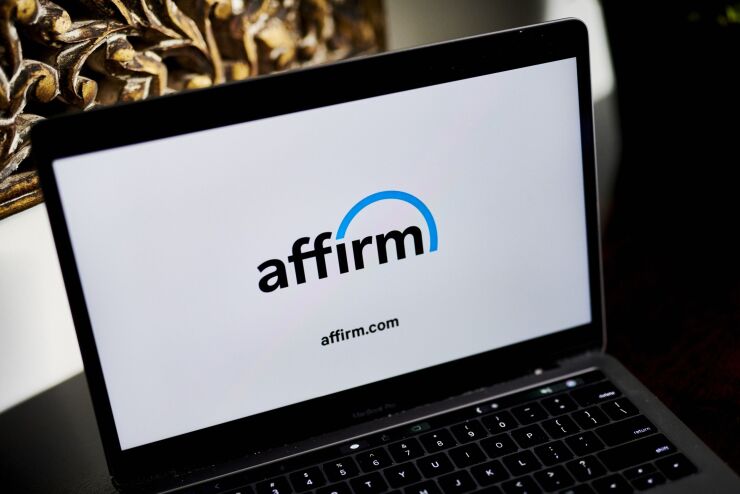By linking its installment lending service to Amazon, Affirm is gaining access to not only one of the largest e-commerce brands on the planet, but also a network of many smaller merchants that connect to Amazon's payment and credit options.
Affirm could replace Amazon's in-house financing option, and the partnership could be irksome to Amazon's other payment partners, such as
"Merchants are hearing from their consumers, who are asking for specific vendors," said Ginger Schmeltzer, a senior analyst at Aite-Novarica. "So if you are a merchant it makes a lot of sense. It's getting harder for the card issuers to play directly in BNPL."

While Affirm and other point-of-sale credit providers won't be replacing credit cards entirely, the addition of Amazon gives Affirm — and by extension, the entire point of sale credit industry — a way to accelerate disruption of traditional bank-card-based credit models. It also allows the San Francisco-based Affirm to make inroads against
There are more than 200 million subscribers for Amazon Prime, with 147 million in the U.S., according to
"For Affirm, acceptance at retailing giants Amazon and Walmart should generate plenty of receivables, and importantly, enormous repeat use," said Eric Grover, a principal at Intrepid Ventures.
By choosing Affirm, Amazon is "tacitly acknowledging" the value proposition of BNPL in general and Affirm in particular, enough to disintermediate Amazon's own card offering in exchange for better sales conversion and larger shopping carts, according to
"BNPL programs are surging, taking share from credit and debit cards," said Grover.
"The timing is perfect for Affirm, as Peloton, their largest client, announced a
Amazon and Affirm did not provide comment for this story. Amazon already offers its own installment and credit products. The e-commerce firm offers the Amazon Prime Visa with 5% cash back on purchases as an incentive; and Amazon has an
The Affirm deal may signal further changes to Amazon's credit products. "Amazon is long rumored to be shopping the JPMorgan Chase-Visa relationship, and already offer various financing options, including a secured Amazon Synchrony card," Riley said.
The difference between most of Amazon's existing credit and financing options and Affirm is a smoother application process for qualifying for credit to pay for a specific purchase, according to Schmeltzer.
"The big factor is Affirm's tech is right at the point of sale," Schmeltzer said. "With card issuers, the tech isn't in place to offer financing for specific purchases directly at the point of sale. It usually happens post-purchase."
Nonbanks have dominated the point-of-sale credit industry thus far, with banks and
Point of sale credit firms position themselves as rivals to bank-issued credit cards, contending installments are easier to understand and don't contribute to revolving debt. The benefit for merchants is the ability to quickly finance large purchases, with the point-of-sale credit provider covering the entire cost upfront and the merchant paying a fee.
During the pandemic, point-of-sale credit firms such as Klarna, Splitit and Affirm have grown quickly, as have installment products from payment companies like PayPal. Square recently agreed to pay $29 billion to acquire Afterpay, and Apple plans its version of BNPL to accompany Apple Pay.
Walmart and Amazon, both Affirm clients, are rivals on several fronts including e-commerce, delivery and in-store technology. Walmart did not return a request for comment. Most retailers do or eventually will offer several point-of-sale credit options, given the popularity of specific BNPL providers with consumers, according to Schmeltzer.
Goldman Sachs could also be a major player in BNPL, said Alyson Clarke, a principal analyst at Forrester Research. A Goldman product called Marcus Pay offers fixed-term installment loans, and the investment bank is Apple's partner for Apple Pay Later. "I see plenty of room in the market for multiple BNPL providers, and of course the next move is the retailer-branded BNPL offering," Clarke said.





